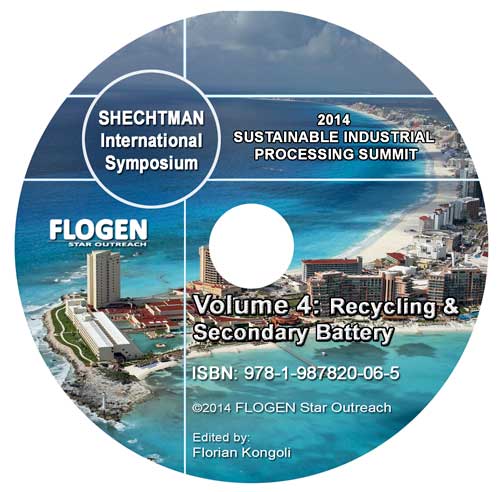2014-Sustainable Industrial Processing Summit
SIPS 2014 Volume 4: Recycling & Secondary Battery
| Editors: | Kongoli F |
| Publisher: | Flogen Star OUTREACH |
| Publication date: | 20 December 2014 |
| Pages: | 498 pages |
| ISBN: | 978-1-987820-06-5 |
| ISSN: | 2291-1227 (Metals and Materials Processing in a Clean Environment Series) |

CD shopping page
Phases and microstructure of ferrochrome converter (CRC) dust
Hannu Makkonen1; Eetu-Pekka Heikkinen1;1UNIVERSITY OF OULU, Oulu, Finland;
Type of Paper: Regular
Id Paper: 196
Topic: 5
Abstract:
Ferrochrome converter (CRC) is used only in the plants, where both ferrochrome and stainless steel are produced in the same location. Raw materials of CRC process are molten ferrochrome and stainless steel scrap and its product is a raw material for argon-oxygen-decarburisation process (AOD). The aim of this work is to characterise chemical composition, phases and microstructure of CRC dust and to evaluate its possible formation mechanisms and the effects of mineralogy and microstructure on the hydrometallurgical treatment of the dust. The analytical methods were X-ray fluorescence (XRF), X-ray diffractometer (XRD), optical microscope and electron probe microanalyzer (EPMA).
The content of Cr in the dust is 11.0 wt-%. When the dust was screened to two fractions, the zinc content was higher in the fine-grained fraction. The dust contains e.g. ferrochrome spheres, magnesiochromite and chromite enclosed into glass spheres, hematite, lime and zincite. Many grains are so small that it is not possible to get a representative microanalysis of them and the totals of the analyses are sometimes too low. ZnO contents in some of these analyses, however, are rather high.
Mineralogy and microstructure of CRC dust are complex. Spheres indicate formation by ejection from the liquid metal or slag. Encapsulation phenomenon, e.g. magnesiochromite enclosed into glass, may influence the leaching of chromium. The dust contains many phases and a part of the grains is too small to be analysed reliably. Probably, all phases of the dust have not been recognised yet.